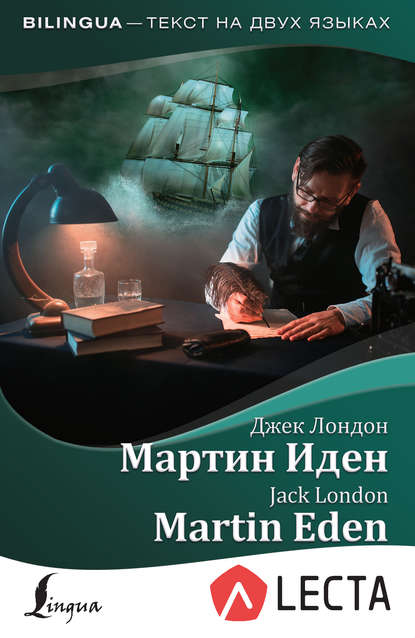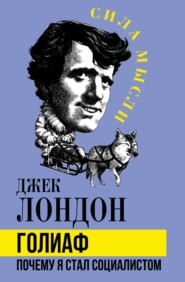По всем вопросам обращайтесь на: info@litportal.ru
(©) 2003-2025.
✖
Мартин Иден / Martin Eden (+ аудиоприложение LECTA)
Настройки чтения
Размер шрифта
Высота строк
Поля
Мартин Иден / Martin Eden (+ аудиоприложение LECTA)
Джек Лондон
Bilingua (АСТ)
Перед вами самый известный роман Джека Лондона «Мартин Иден», рассказывающий о человеке из низов, добившемся признания, но разочаровавшемся в этой насквозь фальшивой жизни. Текст произведения адаптирован и снабжен параллельным переводом на русский язык. Для проверки понимания прочитанного в книге даны упражнения с ответами и англо-русский словарь. Английский текст полностью озвучен носителями языка и бесплатно доступен для прослушивания на сайте российской цифровой образовательной платформы LECTA (lecta.rosuchebnik.ru). Пособие адресовано всем, кто изучает английский язык и хочет читать литературу на языке оригинала.
Джек Лондон / Jack London
Мартин Иден / Martin Eden
© ООО «Издательство АСТ», 2019
Martin Eden
Chapter 1
He opened the door with a key and went in, followed by a young fellow who awkwardly removed his cap. He wore rough clothes of a sailor. He did not know what to do with his cap.
The wide rooms seemed too narrow for him. His heavy arms hung at his sides. He did not know what to do with those arms and hands. He watched the easy walk of the other in front of him, and for the first time realized that his walk was different from that of other men. The sweat burst through the skin of his forehead in tiny beads, and he paused and mopped his bronzed face with his handkerchief.
“Hold on, Arthur, my boy,” he said, attempting to mask his anxiety with facetious utterance. “This is too much for me now. You know I didn’t want to come, and I guess your family doesn’t want to see me at all.”
“That’s all right,” was the reassuring answer. “You mustn’t be frightened at us. We’re just homely people – Hello, there’s a letter for me.”
He stepped back to the table, opened the envelope, and began to read, giving the stranger an opportunity to recover himself. And the stranger understood and appreciated.
An oil painting drew his attention. There was beauty, and it drew him irresistibly. He forgot his awkward walk and came closer to the painting, very close. He did not know painting. He had seen oil paintings, it was true, in the show windows of shops, but the glass of the windows did not allow him to come closer.
Then he saw the books on the table. He glanced at the titles and the authors’ names, read fragments of text, caressing the volumes with his eyes and hands, and, once, recognized a book he had read. He took a volume of Swinburne and began to read. Twice he closed the book on his forefinger to look at the name of the author. Swinburne! he must remember that name. But who was Swinburne? Was he dead a hundred years or so, like most of the poets? Or was he alive still, and writing? He turned to the title-page . . . yes, he had written other books; well, he will go to the library in the morning and try to get some Swinburne’s books. He went back to the text and lost himself. He did not notice that a young woman had entered the room. Suddenly he heard Arthur’s voice saying:
“Ruth, this is Mr. Eden.”
He closed the book. “Mr. Eden!” Everybody called him just “Eden,” or “Martin Eden,” or just “Martin,” all his life. And “Mister!” It was something!
And then he turned and saw the girl. She was a pale, ethereal creature, with wide, spiritual blue eyes and a wealth of golden hair. He did not know how she was dressed, except that the dress was as wonderful as she. She was like a pale gold flower upon a slender stem. No, she was a spirit, a divinity, a goddess. She looked him straight in the eyes as she shook hands, frankly, like a man. The women he had known did not shake hands that way. Never had he seen such a woman.
“Will you sit down, Mr. Eden?” the girl was saying. “Arthur told us. It was brave of you – ”
He waved his hand and muttered that he had done nothing at all. He sat down on the edge of the chair, greatly worried by his hands.
“You have such a scar on your neck, Mr. Eden,” the girl was saying. “How did it happen?”
“A Mexican with a knife, miss,” he answered. “It was just a fight.”
“Oh,” the girl said, in a faint, far voice, and he noticed the shock in her sensitive face.
He felt a shock himself. There was a brief pause in the conversation.
“This man Swineburne,” he began.
“Who?”
“Swineburne,” he repeated, with the same mispronunciation. “The poet.”
“Swinburne,” she corrected.
“Yes, that’s the chap,” he stammered, his cheeks hot again. “How long since he died?”
“Why, I haven’t heard that he was dead.” She looked at him curiously. “Where did you meet him?”
“I never saw him,” was the reply. “But I read some of his poetry out of that book there on the table just before you come in. How do you like his poetry?”
And she began to talk quickly and easily upon the subject that he had suggested. Here was intellectual life, he thought, and here was beauty. He forgot himself and stared at her with hungry eyes. The books were true. There were such women in the world. She was one of them.
“Now Longfellow – ” she was saying.
“Yes, I’ve read it,” he was glad to say so. “‘The Psalm of Life,’ ‘Excelsior,’ and. . . I guess that’s all.”
She nodded her head and smiled, and he felt, somehow, that her smile was tolerant, pitifully tolerant.
“Excuse me, miss. I guess that I don’t know much about such things. But I will know it…”
It sounded like a threat. His voice was determined, his eyes were flashing.
“I think you will know it,” she finished with a laugh. “You are very strong.”
“Yes, I’m not an invalid,” he said. “But most of what you were saying I can’t digest, you see. I like books and poetry, but I’ve never thought about them. That’s why I can’t talk about them. How did you learn all this?”
“By going to school, and by studying,” she answered.
“I went to school when I was a kid,” he began to object.
“Yes; but I mean high school, and lectures, and the university.”
“You’ve gone to the university?” he demanded in frank amazement.
“I’m going there now.”
At the same moment a woman was entering the room. The girl left her chair and came to the woman. They kissed each other. That must be her mother, he thought. She was a tall, blond woman, slender, and stately, and beautiful.
Chapter 2
Their journey to the dining room was a nightmare to him. But at last he had made it. The array of knives and forks frightened him. Well, he must be careful here.
He glanced around the table. Opposite him was Arthur, and Arthur’s brother, Norman. How they loved each other, the members of this family! His nature wanted love. It was an organic demand of his life. He had not known that he needed love.
He was glad that Mr. Morse was not there. The father is too much for him, he felt sure. He had to eat as he had never eaten before, to handle strange tools.
He was unaware of what he ate. It was merely food. Eating was an aesthetic function. It was an intellectual function, too. His mind was stirred. He heard words that were meaningless to him, and other words that he had seen only in books. He said, “Yes, miss,” and “No, miss,” to her, and “Yes, ma’am,” and “No, ma’am,” to her mother. And when she or her mother addressed him as “Mr. Eden,” he was glowing and warm with delight.
Джек Лондон
Bilingua (АСТ)
Перед вами самый известный роман Джека Лондона «Мартин Иден», рассказывающий о человеке из низов, добившемся признания, но разочаровавшемся в этой насквозь фальшивой жизни. Текст произведения адаптирован и снабжен параллельным переводом на русский язык. Для проверки понимания прочитанного в книге даны упражнения с ответами и англо-русский словарь. Английский текст полностью озвучен носителями языка и бесплатно доступен для прослушивания на сайте российской цифровой образовательной платформы LECTA (lecta.rosuchebnik.ru). Пособие адресовано всем, кто изучает английский язык и хочет читать литературу на языке оригинала.
Джек Лондон / Jack London
Мартин Иден / Martin Eden
© ООО «Издательство АСТ», 2019
Martin Eden
Chapter 1
He opened the door with a key and went in, followed by a young fellow who awkwardly removed his cap. He wore rough clothes of a sailor. He did not know what to do with his cap.
The wide rooms seemed too narrow for him. His heavy arms hung at his sides. He did not know what to do with those arms and hands. He watched the easy walk of the other in front of him, and for the first time realized that his walk was different from that of other men. The sweat burst through the skin of his forehead in tiny beads, and he paused and mopped his bronzed face with his handkerchief.
“Hold on, Arthur, my boy,” he said, attempting to mask his anxiety with facetious utterance. “This is too much for me now. You know I didn’t want to come, and I guess your family doesn’t want to see me at all.”
“That’s all right,” was the reassuring answer. “You mustn’t be frightened at us. We’re just homely people – Hello, there’s a letter for me.”
He stepped back to the table, opened the envelope, and began to read, giving the stranger an opportunity to recover himself. And the stranger understood and appreciated.
An oil painting drew his attention. There was beauty, and it drew him irresistibly. He forgot his awkward walk and came closer to the painting, very close. He did not know painting. He had seen oil paintings, it was true, in the show windows of shops, but the glass of the windows did not allow him to come closer.
Then he saw the books on the table. He glanced at the titles and the authors’ names, read fragments of text, caressing the volumes with his eyes and hands, and, once, recognized a book he had read. He took a volume of Swinburne and began to read. Twice he closed the book on his forefinger to look at the name of the author. Swinburne! he must remember that name. But who was Swinburne? Was he dead a hundred years or so, like most of the poets? Or was he alive still, and writing? He turned to the title-page . . . yes, he had written other books; well, he will go to the library in the morning and try to get some Swinburne’s books. He went back to the text and lost himself. He did not notice that a young woman had entered the room. Suddenly he heard Arthur’s voice saying:
“Ruth, this is Mr. Eden.”
He closed the book. “Mr. Eden!” Everybody called him just “Eden,” or “Martin Eden,” or just “Martin,” all his life. And “Mister!” It was something!
And then he turned and saw the girl. She was a pale, ethereal creature, with wide, spiritual blue eyes and a wealth of golden hair. He did not know how she was dressed, except that the dress was as wonderful as she. She was like a pale gold flower upon a slender stem. No, she was a spirit, a divinity, a goddess. She looked him straight in the eyes as she shook hands, frankly, like a man. The women he had known did not shake hands that way. Never had he seen such a woman.
“Will you sit down, Mr. Eden?” the girl was saying. “Arthur told us. It was brave of you – ”
He waved his hand and muttered that he had done nothing at all. He sat down on the edge of the chair, greatly worried by his hands.
“You have such a scar on your neck, Mr. Eden,” the girl was saying. “How did it happen?”
“A Mexican with a knife, miss,” he answered. “It was just a fight.”
“Oh,” the girl said, in a faint, far voice, and he noticed the shock in her sensitive face.
He felt a shock himself. There was a brief pause in the conversation.
“This man Swineburne,” he began.
“Who?”
“Swineburne,” he repeated, with the same mispronunciation. “The poet.”
“Swinburne,” she corrected.
“Yes, that’s the chap,” he stammered, his cheeks hot again. “How long since he died?”
“Why, I haven’t heard that he was dead.” She looked at him curiously. “Where did you meet him?”
“I never saw him,” was the reply. “But I read some of his poetry out of that book there on the table just before you come in. How do you like his poetry?”
And she began to talk quickly and easily upon the subject that he had suggested. Here was intellectual life, he thought, and here was beauty. He forgot himself and stared at her with hungry eyes. The books were true. There were such women in the world. She was one of them.
“Now Longfellow – ” she was saying.
“Yes, I’ve read it,” he was glad to say so. “‘The Psalm of Life,’ ‘Excelsior,’ and. . . I guess that’s all.”
She nodded her head and smiled, and he felt, somehow, that her smile was tolerant, pitifully tolerant.
“Excuse me, miss. I guess that I don’t know much about such things. But I will know it…”
It sounded like a threat. His voice was determined, his eyes were flashing.
“I think you will know it,” she finished with a laugh. “You are very strong.”
“Yes, I’m not an invalid,” he said. “But most of what you were saying I can’t digest, you see. I like books and poetry, but I’ve never thought about them. That’s why I can’t talk about them. How did you learn all this?”
“By going to school, and by studying,” she answered.
“I went to school when I was a kid,” he began to object.
“Yes; but I mean high school, and lectures, and the university.”
“You’ve gone to the university?” he demanded in frank amazement.
“I’m going there now.”
At the same moment a woman was entering the room. The girl left her chair and came to the woman. They kissed each other. That must be her mother, he thought. She was a tall, blond woman, slender, and stately, and beautiful.
Chapter 2
Their journey to the dining room was a nightmare to him. But at last he had made it. The array of knives and forks frightened him. Well, he must be careful here.
He glanced around the table. Opposite him was Arthur, and Arthur’s brother, Norman. How they loved each other, the members of this family! His nature wanted love. It was an organic demand of his life. He had not known that he needed love.
He was glad that Mr. Morse was not there. The father is too much for him, he felt sure. He had to eat as he had never eaten before, to handle strange tools.
He was unaware of what he ate. It was merely food. Eating was an aesthetic function. It was an intellectual function, too. His mind was stirred. He heard words that were meaningless to him, and other words that he had seen only in books. He said, “Yes, miss,” and “No, miss,” to her, and “Yes, ma’am,” and “No, ma’am,” to her mother. And when she or her mother addressed him as “Mr. Eden,” he was glowing and warm with delight.

















